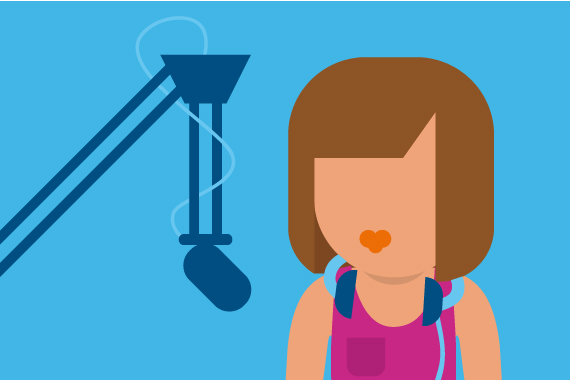My journey with ADHD: Starting medication
I was diagnosed with ADHD at age 20, and within a month I was prescribed stimulant medication. I have to be honest and say that my journey has been more than a roller-coaster and it feels as if I am still nowhere near the end of it. I started by taking it every day as prescribed by my psychiatrist, and the first couple of days I felt super productive and was able to focus on my work a lot better than I had ever been able to. I would sit still at a desk for many hours, and not feel the urge to move every few minutes which did help my productivity. My writing was also flowing a lot better, and I was no longer getting stuck on figuring out if the sentence made sense and hyper-focusing on all the possible mistakes. However, I was also feeling many of its negative side effects. I was not getting much sleep, and my anxiety worsened. After a couple of weeks, my brain fog whilst doing work reduced all the benefits of the medication. However I kept going as prescribed, and as the days went on my body was starting to adapt to the medication and my sleep improved. However, the medication was having less of an effect on me so all of these benefits to decrease ADHD symptoms were slowly fading away.

I then decided to only take it a couple of days a week, when I had more things to do. At the time I thought this would allow me to maintain the effectiveness of the medication to help me concentrate and focus, whilst being able to catch up on sleep on days when I wasn’t taking the medication. However, this really messed with my routine. To me, routine is very important as it gives me consistency and reliability which is vital for my mental health. Not having a consistent bedtime and morning routine made it so the days when I was on the medication I had a lot of energy and the days when I was not on the medication were very unproductive as I was tired and lacked motivation. This resulted in me putting a lot of pressure on myself to do a lot of work on days when I was taking the medication as I knew I would have struggled more on days without it. This, as you can imagine created a lot of stress and blinded me for a while. I was unsure of what to do next. I was now stuck on taking the medication as I had experienced how much my ADHD symptoms could be reduced. However, I was also feeling dependent which made me feel uncomfortable with myself and made me question my abilities. I was struggling to find the motivation without them. As this pattern continued, I started associating anxiety with the medication, so even on days when I was taking it I was unable to work and feel the benefits. Anyway, it all went upside down.
This pattern continued for a while as it was difficult to go back to my daily routine before taking the medication. However, fortunately, over the Christmas break, I did not have as much to do so it was easier to allow myself to take it easy. I am ever since being very cautious with how frequently I am taking the medication. The stress associated with it completely diminished all the positives of it, so I am now working on treating my anxiety. One of the main side effects of using stimulant medication to treat ADHD is that it can increase the symptoms of anxiety, as they work on a part of the brain that is responsible for activating the stress response. It is important to say that I was also diagnosed with generalized anxiety so the extremity to which it pushed me might not be the same for everyone, and everyone does react very differently to ADHD medication. This is just my story.

It has taken seven months but whilst trying out many things those are the coping strategies that I have found the most useful when taking medication and feeling a sense of anxiety rising:
- Mental coping strategies such as: not overworking myself on days when I am on medication and focusing on quality rather than quantity
- Minimizing my daily stressors such as not having many other things to think about other than the work I’m doing
- Taking a lower dose than prescribed, so feeling what is right for me and listening to my body
- Keeping hydrated more than I think I would need, has really helped with my brain fog
- Allowing myself to catch up on sleep over the weekend
- Keep active – doing regular physical activity really calms my anxiety and improves my overall wellbeing
- Trying to minimize intrusive thoughts and distractions for the first couple of hours after taking the medication allows me to set my intentions to only focus on my work and enter a loop which is hard to exit
- Set my intentions and motivations for taking the medication on that particular day being fully aware of what could go wrong and what has worked well in the past – for example remembering that medication helps reduce my ADHD symptoms and it is not a magic potion that makes me super-smart
For more on ADHD visit MindMate’s Neurodiversity Hub


My daughter was recently diagnosed with ADHD, it was a relief to understand what was going on and how to help her. We developed a treatment plan with medication, therapy, and lifestyle changes.
We established a routine, a quiet space, and broke down tasks. The diagnosis was a turning point for our family, and we developed patience and appreciation for ADHD’s unique strengths and challenges.
Seek a professional evaluation if you suspect ADHD. With the right support, children with ADHD can thrive.
We found out that typically AHDH in young women is picked up later in life, as they are better at masking the symptoms.
Greta, thanks for sharing this. We have been on a steep learning curve about neurodiversity in my family over the past few years. This perspective is very helpful. Greta, I appreciate your self-awareness, courage, and openness. These skills will serve you well for years to come!
I was diagnosed with ADHD after being referred for an assessment though the nurse at my school.
The process was slow as the waiting list for an assessment for the NHS service for under 18s was around 18 months, but the assessment itself was thorough and looked at all aspects of my life.
As I was in my a level exam period, we decided medication would be the best option, as I struggled to stay sat down to work and although extra time in exams was very valuable, my exams could last 3-4 hours long, and I had two exams in one day on a few occasions. therefore, taking medication was the best option for me.
now I am no longer in school I don’t take as high a dose, as I find the I don’t have to concentrate for as long periods and only raise my dose as I find necessary, along with advice from professionals and listening to my body.
I find the best ways to cope are communication with the people around me, and being open and honest about symptoms to help those who don’t have ADHD understand how it affects us in many different ways.
ADHD can present differently in everyone, and there is a wide range of symptoms that can be misdiagnosed as other conditions, which is why it is important to be aware of how your symptoms present themselves.
This was very interesting. I love the idea of defining a focused purpose behind taking the medication each time, for example, doing university work.
I think this simplifies the whole experience of being in a stimulated state, indeed preventing intrusions which are a regular problem!
Thanks for your post. I am 33 and have just realised that its not simply a matter of better restraint or a bit more focus. However, my lack of a diagnosis all these years worked in my favor because I have automatically gravitated towards mindfulness practices, CBT, optimal nutrition along with supplementation and refreshing physical activity.
Knowing I have ADHD simply makes potentially tricky situations more easy to spot and prevent. I wanted to read up about experiences of medication on people, so that I have yet another tool in my box to keep my consistency high and wastefulness low.
I hope you are better able to focus these days and have a meaningful and enjoyable occupation in which you are thriving along with the close set of people who put up with our shit. Wish you all the best.
Regards,
JD